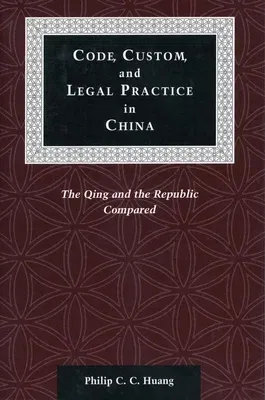Drawing on archival records of actual cases, this study provides a new
understanding of late imperial and Republican Chinese law. It also casts
a new light on Chinese law by emphasizing rural areas and by comparing
the old and the new.
The book asks the question: What changes occurred and what remained the
same in Chinese civil justice from the Qing to the Republic? Civil
justice is here interpreted to mean not only codified law but also
actual legal practice. Since the consequences of court actions
frequently differed from the code's intent, this book also addresses the
question of how legal practice mediated between code and custom. It aims
to track the developing history of the legal system and to discover what
it meant in the lives of the Chinese people.
Part One covers the revising of the Qing code and the drafting of new
codes, especially the Civil Code of 1929-30, the major institutional
changes that preceded the promulgation of new laws, and the organizing
principles of those laws. Part Two, the main body of the text, uses case
records from both the Qing and the Republic to examine certain topics
that engendered frequent litigation: conditional sales of land, topsoil
ownership, debt, old-age support, and women's choices in marriage,
divorce, and illicit sex.
The book demonstrates the contrasting logics of Qing and Republican law:
of privileges granted by the absolutist ruler versus rights independent
of the will of the ruler, of a survival ethic versus a capitalist one,
of patrifamilial property versus individual property, of reciprocal
parent-child support versus unidirectional support, and of partial and
limited choice for women versus independent agency. The book shows,
however, that in actual practice the new legal systems made many
accommodations to traditional customs, thus making major concessions to
social realities while still holding to radically different principles.
The author demonstrates the inadequacies of a simple contrast between
the Chinese legal tradition and modernity, or between China and the
West. He argues instead for paying attention to the local knowledge of
modernization and to the logics not only of the codes but also of
customs and court actions. He shows, finally, the importance of both
systemic structure and individual choice for this social and cultural
study of Chinese law.

